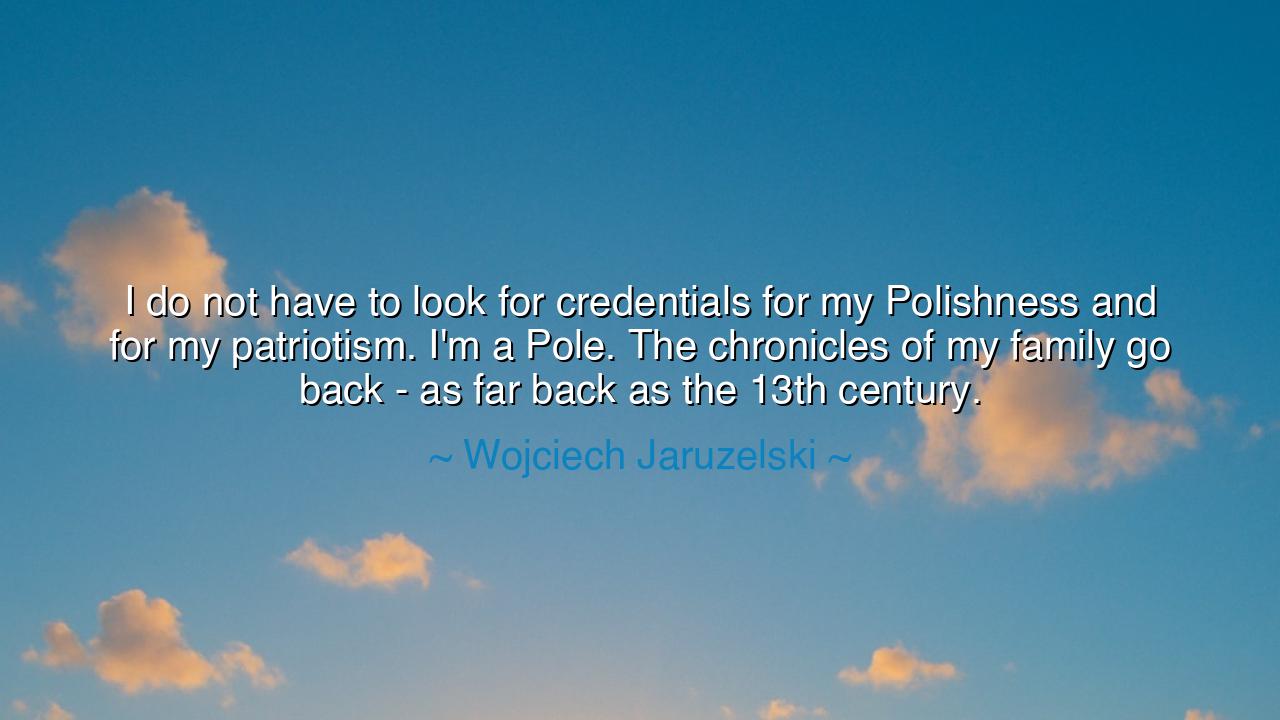
I do not have to look for credentials for my Polishness and for
I do not have to look for credentials for my Polishness and for my patriotism. I'm a Pole. The chronicles of my family go back - as far back as the 13th century.






The words of Wojciech Jaruzelski—“I do not have to look for credentials for my Polishness and for my patriotism. I’m a Pole. The chronicles of my family go back—as far back as the 13th century.”—ring with the weight of heritage and the pride of belonging. Here speaks not only a man, but the echo of generations. In his voice we hear the defiance of someone whose identity is so deeply rooted in history that it needs no external validation. His patriotism is not an ornament he wears, nor a certificate he seeks—it is the living blood that flows through him, inherited from the struggles and sacrifices of ancestors who bore the Polish name long before him.
The ancients knew that identity is both gift and burden. Athenian citizens proclaimed their descent from the soil itself, believing they were born from the very earth of Attica. Roman nobles traced their lineages to mythical heroes, for in ancestry lay honor and authority. Jaruzelski follows in this tradition when he points to his family chronicles stretching back to the 13th century. In this, he claims that his love for Poland is not a mask to be questioned by others, but an inheritance as old as the Polish nation itself. His Polishness is not a matter of proof, but of existence.
To understand the weight of his words, one must recall the history of Poland—a land often divided, conquered, erased from maps, yet never destroyed in spirit. For centuries, Poles clung fiercely to their identity in the face of foreign rule. When their state was partitioned in the 18th century, when it was crushed under empires, when its people were exiled or silenced, still they whispered to one another: we are Polish, we endure. To claim Polishness in such a context was no small thing—it was an act of resistance, a declaration of survival. Jaruzelski’s statement, then, is not merely personal pride, but a reflection of this collective memory.
History offers us other figures who spoke similarly. Consider the Irish patriots of the 19th century, who under British rule proclaimed their Irishness despite imprisonment and exile. Or the Jewish people, who across millennia of dispersal, exile, and persecution still declared their identity, rooted in ancestry and tradition. In each case, as with Jaruzelski, patriotism was not something to be proven to others; it was carried in the soul, in memory, and in the unbroken chain of lineage.
But Jaruzelski’s words also contain a challenge. For if patriotism is inherited, then it is also a duty. To be the heir of centuries is to bear the responsibility of honoring that legacy. His words remind us that heritage is not only pride but obligation. The chronicles of his family reach back to the 13th century—but what will future chronicles say of him? Of us? This is the question each generation must answer: we are heirs, but will we also be worthy ancestors?
The lesson is clear: you do not need permission to belong to your people. Your identity, your patriotism, your loyalty to your land and heritage, need not be measured by credentials. It is written in the way you live, in the respect you show to those who came before, in the sacrifices you are willing to make for those who will come after. The soil of your homeland does not ask for certificates—it asks for your devotion, your service, your truth.
Practical action flows from this wisdom. Learn the history of your family, your people, your nation—carry it with reverence. Live so that you add honor, not shame, to the chronicles of your name. Do not allow others to define your loyalty, for patriotism is not in proclamations but in deeds. Serve your country by preserving its culture, by working with honesty, by protecting its dignity. And remember always: the truest measure of identity is not what you claim, but what you give back to the land that gave you life.
Thus, Jaruzelski’s words endure like the voice of an elder standing at the crossroads of past and future: I am a Pole, and need no credentials to prove it. So too may each of us one day say: I am my people’s child, and my deeds are the proof. For in such words lies the eternal bond between ancestry and destiny, between who we are and who we must become.






AAdministratorAdministrator
Welcome, honored guests. Please leave a comment, we will respond soon